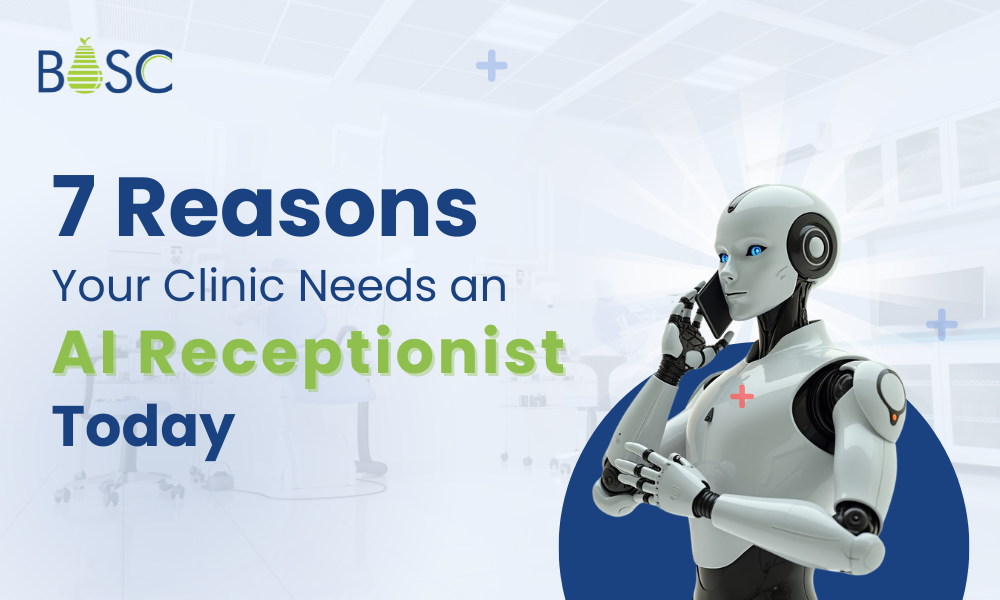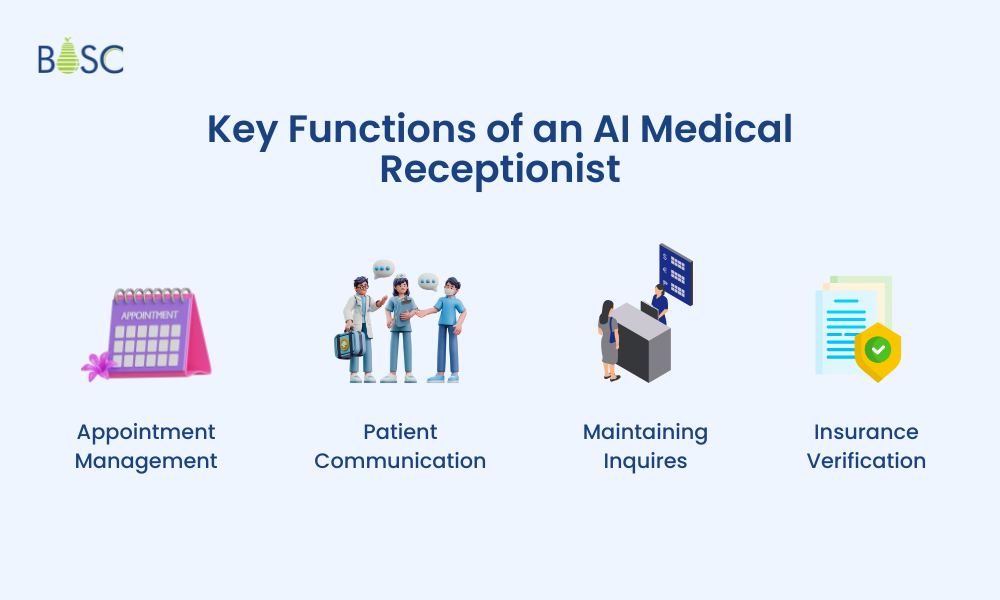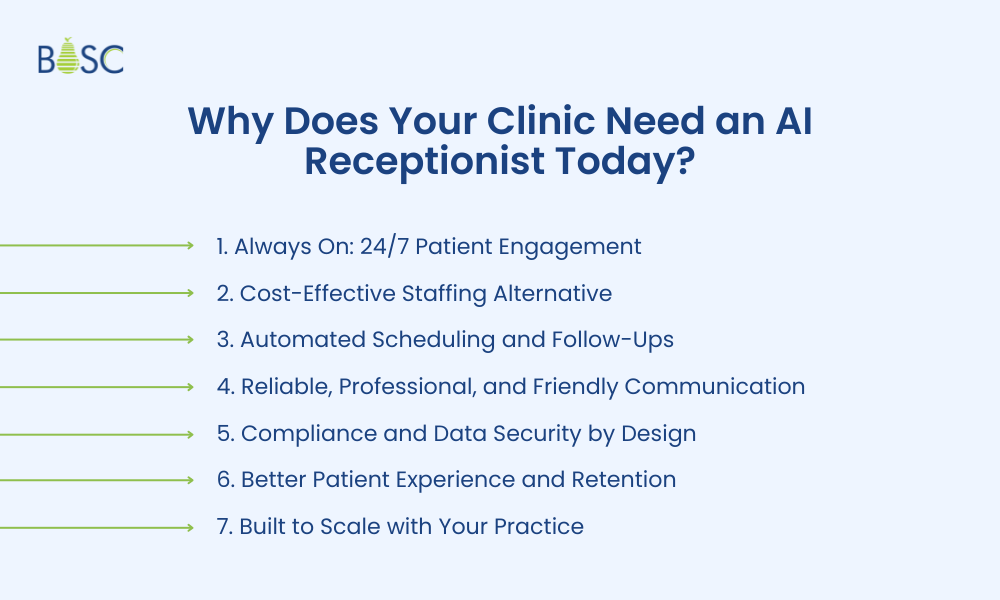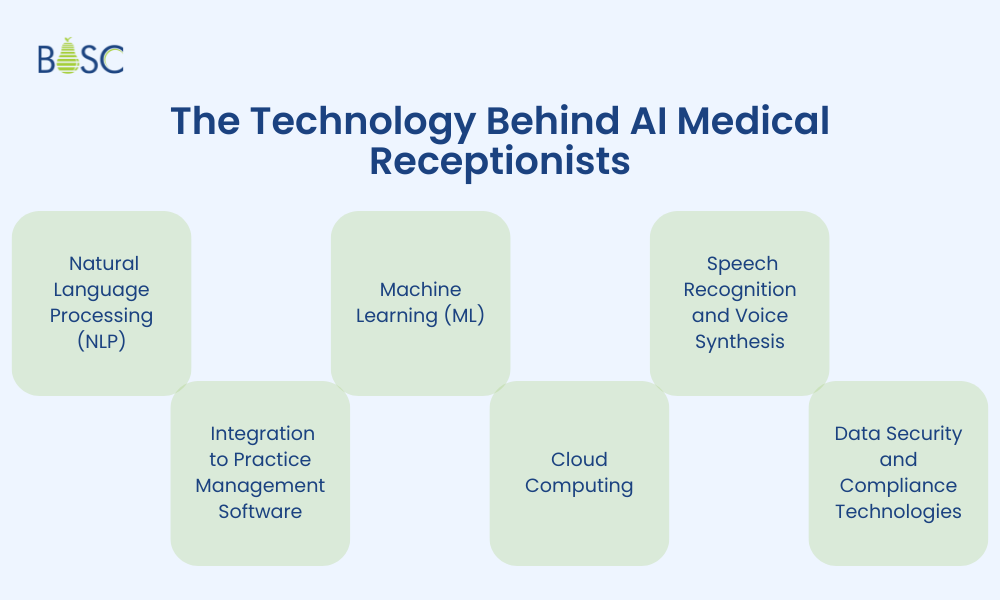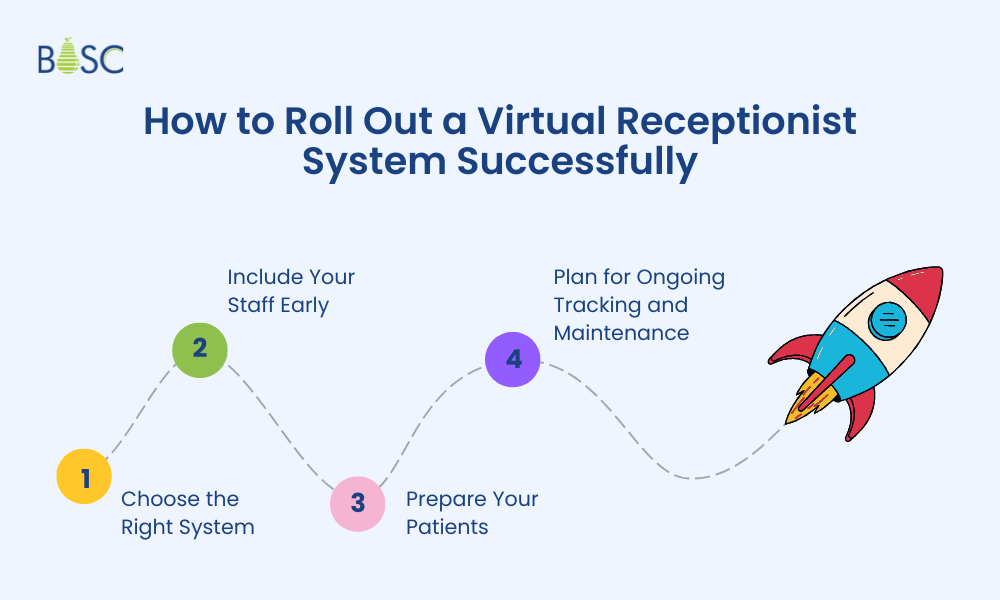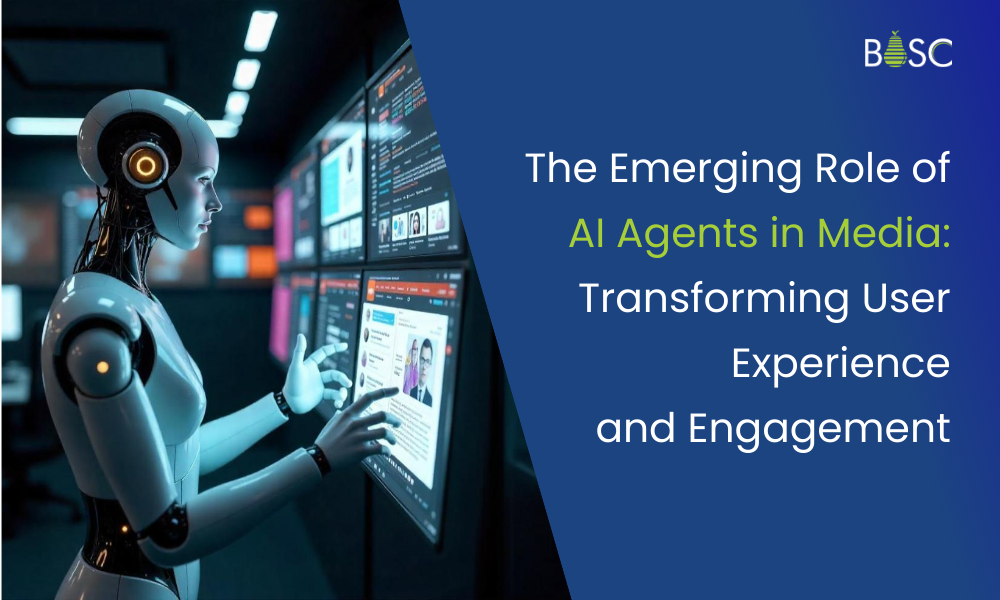Imagine a new patient calling your office at 7:45 PM on a Friday. You and your staff have gone home for the weekend and it’s dead silence until Monday. The voicemail answers the call. Not only did you miss a new appointment call but you could’ve even missed the same patient calling for their follow-up or referring to their long-time patient when they were out for lunch. This one missed call is due to your competition providing quicker and more accessible patient care. That is where automation is emerging, and what a success it’s becoming!
As healthcare continues to evolve and progress towards automation, the traditional front desk is often full of challenges and hurdles—human error, limited availability, and rising costs. AI receptionists can take over, as 24/7, reliable, quick recall, and accurate support staff. They are capable of taking care of scheduling duties, securely communicating with patients, streamlining processes, providing accurate information, and making the patient experience smoother.
Key Functions of an AI Medical Receptionist
As an experienced AI app development company, we understand how an AI Medical Receptionist can help you manage several valuable daily tasks that keep your clinic running smoothly and efficiently.
1. Appointment Management
The AI will book, reschedule, and cancel appointments all in real-time, updating your calendar to eliminate double bookings and conflicts, while allowing for continued and consistent patient flow.
2. Patient Communication
There are many ways the AI can communicate to patients such as sending appointment reminders, answering commonly asked questions, and sending general information updates. In other words, the AI Medical Receptionist has an ability to communicate through phone calls, emails, or chat messages to keep the patient informed, and ultimately help prevent missed appointments.
3. Maintaining Inquires
Patients naturally ask routine questions, such as office hours, services offered, or simple directions, and these questions often require asking staff. The AI Medical Receptionist simplifies this process because it can provide precise & instant answers to every patient’s inquiry, and not burden available staff with questions that are possible and achievable with AI.
4. Insurance Verification
Confirming insurance information can be lengthy and labor-intensive or, on occasion, nearly impossible to complete. The AI Medical Receptionist will help alleviate this burden by confirming the patient’s insurance information in advance, simplifying bill collection, while saving valuable time lost with the insurance verification process.
Now that you are aware of the primary functions of your medical virtual assistant, let’s move onto how they can help you achieve customer satisfaction and dependable service!
Why Does Your Clinic Need an AI Receptionist Today?
1. Always On: 24/7 Patient Engagement
Patients don’t stick to a 9-to-5 schedule—and neither should your clinic. An AI receptionist means the clinic is always open, so you never miss a call, question, or appointment after hours. Your patients will always get to book, re-book, or at the very least, retrieve the information they need, be it midnight or the Fourth of July.
Spontaneous replies build trust and keep your clinic engaged even when you are occupied with your commitments. Also, practically with sudden appointments at any time of day, the chances of no-shows are virtually eliminated and the chances of retaining patients drastically increases—without adding to your staff’s workload.
2. Cost-Effective Staffing Alternative
Managing a front desk can take time and money especially when your patient volume increases. You can reach out to our team for an AI receptionist, which is a smart and good value replacement for a receptionist who has to answer the phone, book appointments, follow up on appointments, etc. It would eliminate the need for overtime or a new employee.
AI receptionists are designed for a higher call volume; it does not fatigue, burn out, or make errors. Most importantly, it will allow your in-house team to focus on providing patient care instead of multi-tasking, giving your office a more organizational structure with less staff and cost while achieving a more professional, responsive, and coherent front to the office.
3. Automated Scheduling and Follow-Ups
When appointments are managed manually, it can lead to double bookings, last-minute craziness, or forgotten reminders. An AI receptionist will connect with your clinic calendar and relieve some of the pressure off your employees. Your AI receptionist will organize appointments, confirm appointments, send out patient reminders, and respond to cancellations or rescheduling in real-time.
An AI receptionist will keep your scheduling organized and increase patient show-up rates. The back-and-forth is eliminated and gone are the days of double-booked appointments so your workflow is simplified, and front desk staff can work more efficiently than ever.
4. Reliable, Professional, and Friendly Communication
With an AI receptionist, every interaction between the patient and office is consistent, tranquil, and courteous—no sick days, no mood changes, and no rushed interactions. It uses tone-optimized scripts and the same talking points to create welcoming, professional, and supportive conversations. No matter how busy the office is, and no matter the intensity of a situation, communication from the AI receptionist is consistent and poised.
Patients can choose the language they feel most comfortable speaking with their AI receptionist, ensuring that patients feel understood and represented. Culturally-relevant responses add to the richness of the whole experience, allowing the patient to feel comfort, inclusion, and togetherness, building a patient relationship right from the initial point of contact.
5. Compliance and Data Security by Design
Patient privacy is not an optional requirement, it is a necessity. We develop your AI receptionist with compliance and data protection as its core. With HIPAA-compliant encryption, your patients’ sensitive information about health is secure at all times throughout each patient interaction. It limits accessibility for unauthorized users, and no logic or judgment makes it inevitable to grant patient information access or modification.
Full audit trails are present guaranteeing all data action is recorded in detail and you’re always aware of if and when anyone has access to it. Automation significantly mitigates risk while reducing human error in sending information to the wrong contact or mishandling forms in a way that a manual system is subject to.
Also Read: The Emerging Role of AI Agents in Media: Transforming User Experience and Engagement
6. Better Patient Experience and Retention
Prompt responses matter for patient experience! An AI receptionist leaves nothing to chance with expedient call and message assignments. Each time a call or text is answered instantly leaves less room for misconnecting with a patient. Furthermore, fast, consistent, and clear messaging takes patients easily through booking, reminders, and follow-up—leaving less room for confusion, and frustration.
Plus, AI can enhance interpersonal communication by tagging returning patients, customizing communication to their preferences and past, and taking any appropriate action. This intentionality gives a patient a sense of value and acknowledgment, increases their loyalty, and may encourage them to return. By being a seamless responsive communication from the first contact, clinics build stronger relationships that will last.
7. Built to Scale with Your Practice
As your clinic expands, so will your administrative demands—with an AI receptionist scaling effortlessly to meet your demand; whether a clinic adds locations, expands its services, or adds patient volume, AI technology will adapt and grow with ease. AI technology is flexible and configurable to accommodate the unique workflows and specialty requirements of different practices, including general practices and specialized clinics that conduct focused consultations. This means every patient interaction is seamless and dynamic, regardless of how many moving parts affect your operations.
AI receptionists are easy to support, requiring minimal IT support and maintenance, so you can optimize your team as shaped by your local operational model—this relief eliminates the choice of valuable time spent on IT-related initiatives. Plus, the deployment of your AI receptionist is as simple as downloading an app, and the updates will be made behind the scenes! You get to focus on your team’s growth, and patient care and experience, knowing your front desk can handle whatever comes!
The Technology Behind AI Medical Receptionists
AI medical receptionists use advanced technology to perform their jobs in a timely and accurate manner. Here’s a list of the technological components that help power these smart technologies:
1. Natural Language Processing (NLP)
NLP allows AI receptionists to fully understand and process human language—both spoken and written. The expert AI developers at Bosc Tech Labs integrate this technology to develop a natural conversational dialogue with patients, allowing AI receptionists to assess a patient. Once assessed, the AI can respond properly without sounding like a robot.
2. Machine Learning (ML)
Machine learning is used when an AI system learns over time through the analysis of data and the experience of interactions. As more patients interact with the AI receptionist, it becomes progressively better at understanding common questions, predicting the patient’s needs, and accurately responding.
3. Speech Recognition and Voice Synthesis
Speech recognition provides the AI with the ability to take spoken words and accurately convert them into text, allowing for call-in or voice based interaction. Our experts profess to use voice synthesis, which has advanced at an impressive pace, allowing the AI to respond using human-like speech that seems natural and fun during interaction.
4. Integration to Practice Management Software
AI Receptionists would connect directly with the existing software that already runs the clinic, through scheduling, billing, and electronic health records (EHR) components. This integration would facilitate real-time updates and accurate information management for patient-related data and appointments.
5. Cloud Computing
With cloud-based AI, clinics can leverage the capabilities of machine learning and utilize powerful AI tools without breaking the bank on expensive hardware and IT infrastructure. As updates, backups, and security are built-in for cloud-based AI solutions, clinics get its benefits too!
6. Data Security and Compliance Technologies
AI receptionists are designed with strong security features built-in to protect sensitive clinical data. AI receptionists are designed with strong security features that encrypt data, and ID and restrict access, meet regulatory compliance requirements (like HIPAA) to limit patient information, and come into contact with unauthorized users.
Together, all of these technologies enable AI medical receptionists to provide consistent, reliable, efficient, and safe support, which enables a fundamentally different approach to patient interaction and administration.
Challenges of Implementing a Virtual Receptionist Integration
While the benefits of an AI Medical Receptionist are significant, integrating this technology can come with a few challenges to keep in mind:
1. Integration with Current Systems
AI receptionists will not operate as intended without proper integration into your Electronic Health Records (EHR), scheduling, and billing. The integration stage will be the most complicated.
Once you reach out to us for AI Receptionist development, our team will ensure to integrate them with your existing system too. We have a solid team to help you mitigate risk and ensure minimal disruption to the workflows and daily operations of the clinic.
2. Resistance from Staff
It is not uncommon that staff may wonder about their own job security or the benefits of putting their faith in Artificial Intelligence over human interaction. Involving the team earlier in the decision-making and addressing these concerns can help alleviate some resistance. Our team communicates the benefits and how the AI will improve service with training to ease acceptance.
3. Patient Acceptance
Not all patients will be comfortable communicating through AI, especially older adults and patients who are not devices-savvy. Communicating how the AI will improve scheduling and communication should help patients build trust. Providing a direct and easy option to simply reach out to a human receptionist with any questions will help every patient feel accommodated and valued.
How to Roll Out a Virtual Receptionist System Successfully
1. Choose the Right System
Virtual receptionist options vary throughout the industry. Not all of them offer the same features or capabilities, and they may even work differently with your practice management software. Our team helps you systematically set up the virtual receptionist for the particular workflows of your clinic and the needs of your patient population. Thinking about a systematic design for the virtual receptionist will allow you to make the best use of the virtual receptionist platform and leverage your cost benefit.
2. Include Your Staff Early
When implementing a new virtual receptionist system, it will be critically important to have your team engaged right from the start. Starting with the reasons why the new virtual receptionist is going to benefit them and the patient experience as a whole, is the way to build up buy-in! This process should include openly addressing any concerns your staff have, along with training that allows them to try the solution hands-on, become comfortable with it, and increase their confidence in utilizing the AI receptionist.
3. Prepare Your Patients
Engage with your patients to let them know about the changes in advance. Advise them that their future experiences with scheduling and the use of the virtual receptionist will be more streamlined and efficient; with faster scheduling, quicker reminders and follow-up, etc. Provide them specific prompts and instructions around how to deal with the virtual receptionist and re-iterate how they can always re-engage with a human being if necessary.
4. Plan for Ongoing Tracking and Maintenance
AI technology is constantly changing and evolving, therefore good/prudent administrative practice would be to continue to ensure support for ongoing maintenance, and if and when necessary, updating your virtual reception system. Find a provider who can not only support your virtual receptionist with good technical support but also one who can do updates as technology and healthcare standards continue to evolve and shift, to help make sure your advancement doesn’t fall behind your investment.
Conclusion
AI medical receptionists provide seven major benefits: the convenience of 24/7 patient interaction, cost-effective staffing, automated scheduling and follow-ups, dependable and friendly communication, strong compliance and data security, improved patient experience and retention, and easy scalability as your practice grows. In concert, these benefits allow clinics to operate more efficiently, reduce administrative work, and provide a smoother, more personalized experience for their patients.
Using AI technology in your front office will not only simplify the day-to-day but also give staff the ability to focus on what they do best, quality patient care. If you’re looking to improve clinic operations and patient satisfaction, now is the time to see how an AI medical receptionist can redefine your practice and help with your growth. Make the next move, and see the impact an AI reception can have on your clinic’s success.

